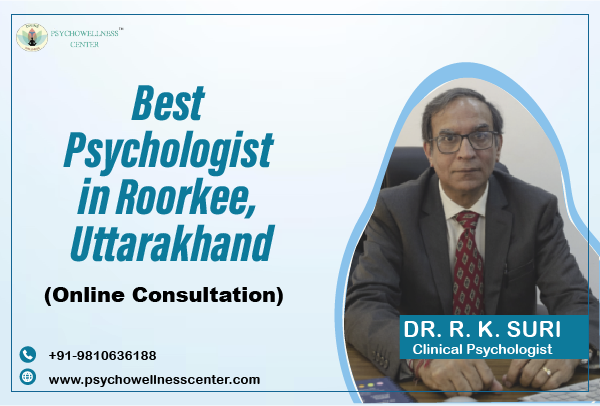Best Clinical Psychologist in Dwarka Sector 11 Dwarka Delhi

Eating disorders, such as anorexia nervosa, bulimia nervosa, and binge-eating disorder, are complex mental health conditions that require a multidisciplinary approach for effective treatment. Psychological interventions play a vital role in addressing the underlying factors contributing to eating disorders, promoting recovery, and preventing relapse. This blog explores the importance of psychology in treating eating disorders, highlighting key therapeutic approaches, the significance of a supportive environment, and the impact of professional guidance.
Understanding Eating Disorders
Eating disorders are characterised by severe disturbances in eating behaviours and preoccupations with food, body weight, and shape. These conditions are often accompanied by psychological distress, low self-esteem, and distorted body image. Common eating disorders include:
Anorexia Nervosa: Restrictive eating, intense fear of gaining weight, and an unhealthy obsession with being thin.
Bulimia Nervosa: Episodes of binge eating followed by compensatory behaviours such as purging or excessive exercise.
Binge-Eating Disorder: Recurrent episodes of overeating without compensatory behaviours, leading to feelings of guilt and shame.
Psychological factors, such as perfectionism, trauma, societal pressures, and underlying mental health conditions (e.g., anxiety or depression), often contribute to the development and maintenance of these disorders.
The Role of Psychology in Treating Eating Disorders
1. Identifying Underlying Causes
Psychologists help patients uncover the root causes of their eating disorders. Through detailed assessments, they identify triggers such as trauma, societal expectations, or familial pressures, providing valuable insights into the condition.
2. Cognitive Behavioral Therapy (CBT)
CBT is one of the most effective psychological treatments for eating disorders. It focuses on:
Challenging and changing distorted beliefs about food, weight, and body image.
Cultivating more effective ways to manage stress and emotional triggers.
Establishing regular and balanced eating patterns.
3. Dialectical Behaviour Therapy (DBT)
DBT is particularly helpful for individuals with eating disorders who struggle with emotional regulation. It teaches skills in mindfulness, distress tolerance, emotion regulation, and interpersonal effectiveness to reduce harmful behaviours.
4. Family-Based Therapy (FBT)
For adolescents with eating disorders, FBT engages the family as an essential part of treatment. Parents and caregivers take an active role in ensuring their child’s nutritional needs are met while helping them develop healthier attitudes toward food and body image.
5. Addressing Co-Occurring Disorders
Many individuals with eating disorders also experience anxiety, depression, or obsessive-compulsive disorder (OCD). Top Psychologists address these co-occurring conditions to ensure comprehensive treatment.
6. Building Self-Esteem and Resilience
Low self-esteem and a negative self-image are common in people with eating disorders. Therapists use strategies to rebuild confidence, foster self-acceptance, and promote positive self-talk.
7. Preventing Relapse
Psychologists equip patients with tools to prevent relapse, such as stress management techniques, relapse prevention plans, and a strong support network. Continued therapy and follow-up sessions are crucial to maintaining recovery.
The Importance of a Supportive Environment
A supportive environment is essential for successful recovery from an eating disorder. This includes:
- Family Support: Educating families about the disorder and involving them in the recovery process can create a nurturing and understanding environment.
- Peer Support Groups: Connecting with others who share similar experiences provides validation, encouragement, and a sense of belonging.
- Professional Collaboration: A team approach involving psychologists, dietitians, medical professionals, and psychiatrists ensures comprehensive care.
Psychological Expertise at PsychoWellness Center
PsychoWellness Center is a trusted mental health facility dedicated to providing specialised care for eating disorders. The center employs a team of experienced psychologists who tailor treatments to each individual's needs, combining evidence-based approaches with empathy and understanding. With a strong emphasis on collaborative care, PsychoWellness Center supports patients in their journey toward recovery and self-acceptance.
- Dr. R. K. Suri, a distinguished clinical psychologist, is renowned for his expertise in treating eating disorders. With decades of experience, he combines innovative techniques with a compassionate approach to address the psychological complexities of eating disorders. His work emphasises the importance of addressing emotional and behavioural aspects to ensure lasting recovery.
- Kala Sengupta, a skilled psychologist, brings a unique perspective to the treatment of eating disorders. Her holistic approach incorporates mindfulness and emotional healing, empowering patients to reconnect with their bodies and embrace a healthier relationship with food.
- Utkarsh Yadav is known for his focus on evidence-based interventions such as CBT and DBT. His structured and goal-oriented therapy sessions help individuals challenge negative beliefs and develop practical skills to manage their eating disorder symptoms effectively.
- Sakshi Dhankhar specialises in creating a safe and supportive therapeutic environment for her clients. She emphasises the role of self-compassion and emotional regulation in recovery, helping patients navigate their emotions and rebuild a positive self-image.
- Tanu Sangwan, an experienced psychologist, prioritises individualised care for her clients. She integrates psychological therapies with psychoeducation, ensuring that patients and their families are well-informed and actively involved in the recovery process.
Conclusion
The psychological treatment of eating disorders is a multifaceted process that addresses the root causes, distorted beliefs, and emotional struggles associated with these conditions. With the right combination of therapeutic interventions, a supportive environment, and professional expertise, individuals can achieve lasting recovery and rebuild their relationship with food and body image.
If you or a loved one is struggling with an eating disorder, seeking help from a trained psychologist is the first step toward healing. At PsychoWellness Center, professionals like Dr. R. K. Suri, Kala Sengupta, Utkarsh Yadav, Sakshi Dhankhar, and Tanu Sangwan are committed to guiding you through this journey with care, understanding, and evidence-based treatments.
Contributed by Ms Tanu Sangwan, Counselling Psychologist
References
- National Eating Disorders Association. (2023). Understanding Eating Disorders. Retrieved from www.nationaleatingdisorders.org
- American Psychological Association. (2023). Psychological Treatment for Eating Disorders. Retrieved from www.apa.org
- World Health Organization. (2022). Mental Health and Eating Disorders. Retrieved from www.who.int




SHARE